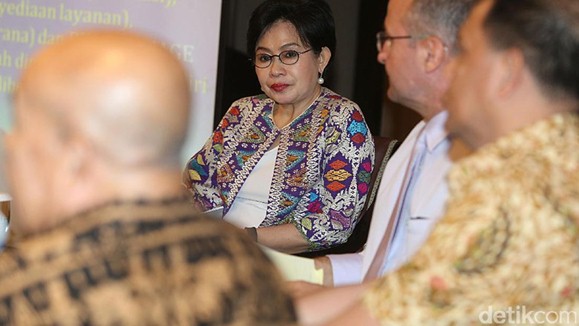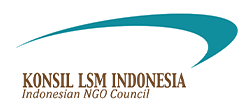 Laporan Indeks Keberlanjutan Organisasi Masyarakat Sipil Asia 2015 secara khusus untuk Indonesia memperoleh skor 4,1 atau berada dalam range ‘keberlanjutan berkembang’. Ada 7 dimensi yang dinilai yaitu lingkungan hukum, kapasitas organisasi, keberlanjutan finansial, advokasi, penyedia layanan, infrastruktur dan citra publik. Dibandingkan dengan skor keseluruhan skor akan citra publik lebih rendah yaitu 4,3.
Laporan Indeks Keberlanjutan Organisasi Masyarakat Sipil Asia 2015 secara khusus untuk Indonesia memperoleh skor 4,1 atau berada dalam range ‘keberlanjutan berkembang’. Ada 7 dimensi yang dinilai yaitu lingkungan hukum, kapasitas organisasi, keberlanjutan finansial, advokasi, penyedia layanan, infrastruktur dan citra publik. Dibandingkan dengan skor keseluruhan skor akan citra publik lebih rendah yaitu 4,3.
Dalam acara Speakers Event: Citra Publik Organisasi Masyarakat Sipil (OMS) yang diadakan pada 9 Maret 2017, yang bertujuan untuk mengkonfirmasi bagaimana nilai tersebut dalam kenyataan di lapangan dan berdiskusi lebih lanjut. Maka narasumber yang hadir terdiri dari kalangan pemerintah maupun bisnis. Selain itu juga diundang dari KPK dikarenakan citra publik OMS yang buruk terjadi juga karena adanya kasus-kasus korupsi yang dilakukan oleh LSM. Dimana kasus-kasus yang terjadi kepada OMS menyebabkan buruknya indikator-indikator untuk mengukur citra publik yaitu; pemberitaan media, persepsi publik terhadap OMS, persepsi pemerintah dan perusahaan terhadap OMS, hubungan masyarakat dan pengaturan diri sendiri.
 Suryani Motiek (WKU Kadin Bidang CSR dan Persaingan Usaha) mengungkapkan bahwa “Bagi perusahaan yang terpenting dalam kerjasama dengan OMS adalah ; kepercayaan, tepat sasaran dan keberlanjutan”. Sehingga jika LSM dapat menampilkan hal-hal tersebut, perusahaan akan merasa ‘aman’ dalam bekerja sama dengan LSM melalui dua mata anggaran yang biasa disalurkan yaitu Corporate Social Responsibility dan Dana Alokasi Bagian (Pos Marketing).
Suryani Motiek (WKU Kadin Bidang CSR dan Persaingan Usaha) mengungkapkan bahwa “Bagi perusahaan yang terpenting dalam kerjasama dengan OMS adalah ; kepercayaan, tepat sasaran dan keberlanjutan”. Sehingga jika LSM dapat menampilkan hal-hal tersebut, perusahaan akan merasa ‘aman’ dalam bekerja sama dengan LSM melalui dua mata anggaran yang biasa disalurkan yaitu Corporate Social Responsibility dan Dana Alokasi Bagian (Pos Marketing).
La Ode Ahmad P. Balombo (Direktur Ormas, Kemendagri) menyatakan “Konstitusi menjamin kebebasan berorganisasi, namun konstitusi juga mengatur OMS agar mendukung NKRI”. Sehingga tentu Pemerintah berharap bahwa AD/ART Ormas tidak bertentangan dengan konstitusi negara. Pemerintah mengakui ormas adalah mitra pemerintah dalam perspektif good governance, pemerintah pasti mendukung dengan berbagai regulasi untuk menjamin eksistensi keberlanjutan ormas akan tetapi ormas juga harus berani melakukan instropeksi bagaimana dirinya sudah memberikan kontribusi kepada masyarakat (self-reflection – self-regulation)
Ramah Handoko (KPK) menyatakan bahwa “Keberadaan OMS sangat penting untuk KPK, mengacu keapda UU KPK tahun 2002 bahwa dalam proses pencegahan korupsi harus melibatkan partisipasi masyarakat”. Sementara dari data yang dimiliki KPK, misalnya di Banten ada 1000an lebih LSM dan yang terverifikasi sebagai LSM sungguhan hanya 30 an, yang tentu merupakan suatu ironi. Bahkan ditemukan alamat foto copy sebagai alamat kantor LSM, banyak LSM yang dimiliki anggota dewan dan anggota partai yang didirikan untuk menerima dana bansos.
Kemunculan LSM-LSM palsu ini atau kemudian disebut sebagai LSM psedo yang menyebabkan semakin buruknya citra LSM di mata publik. Menutup Diskusi, Peter Van Tuijl selaku moderator menyatakan bahwa pembicaraan mengenai citra publik memang sangat subjektif, banyak hal yang bisa muncul namun kepercayaan terhadap LSM tidak hanya dibangun oleh kualitas SDM dan aspek-aspek teknis tetapi ketika LSM mampu menjaga integritasnya baik aktivis LSM maupun organisasnya. Dalam hal ini perlu adanya Kode Etik LSM dan Standar Minimal Akuntabilitas dimana LSM mampu menampilkan dan mendemonstrasi kerja-kerjanya.
 In the Civil Society Organisations Sustainability Index (CSOSI) Asia Report for 2015, Indonesia scoring 4,.1, being in the range Sustainability Evolving. There 7 Dimension to score in the CSOSI which are, legal environment, organisational capacity, financial viabuility, advocacy, service provider, infrastructure, and public image. Compared with the overall Indonesia score, the score for public image is lower at 4.3.
In the Civil Society Organisations Sustainability Index (CSOSI) Asia Report for 2015, Indonesia scoring 4,.1, being in the range Sustainability Evolving. There 7 Dimension to score in the CSOSI which are, legal environment, organisational capacity, financial viabuility, advocacy, service provider, infrastructure, and public image. Compared with the overall Indonesia score, the score for public image is lower at 4.3.
The Speakers Event : CSO Public Image held on March 9th, 2017 aimed to present the score for further discussion. That is why the speakers as well the participants came from various backgrounds, business to government. Besides that there was representation from the Corruption Eradication Commission (KPK) because corruption is one of the factor that cause CSOs’ poor public image. There are various indicators of public image, which are; media coverage, public perception to CSO, business and government perception to CSO, public relations and self regulations.
 Suryani Motiek (Vice of Kadin for CSR and Business Competition), said “For the Corporation, the most importance for partnership with CSO are; trust, right on target and sustainability”. So if CSO or particularly NGO can demonstrate those things, corporates will feel safer in having the partnership. There are usually two key budget for partnership with CSO which are Corporate Social Responsibility and Allocation Fund (Marketing Post).
Suryani Motiek (Vice of Kadin for CSR and Business Competition), said “For the Corporation, the most importance for partnership with CSO are; trust, right on target and sustainability”. So if CSO or particularly NGO can demonstrate those things, corporates will feel safer in having the partnership. There are usually two key budget for partnership with CSO which are Corporate Social Responsibility and Allocation Fund (Marketing Post).
La Ode Ahmad P. Balombo (CBO Director General Directorate of Politics and Public Administration, Ministry of Interior) said “The constituion guarantee for freedom of expression, however the constitution also regulate that CSOs have to support Indonesia Republic”. So the government ask that CSOs Article/Memorandum of Association do not contradict with state constitution. Government recognizes that CSOs are partners of the government partner in the good governance perspective. Therefore government support the CSO through regulation to ensure CSO Sustainability, and the CSOs also has to be brave to do self-reflection what they can contribute to the society.
Ramah Handoko (KPK) stated that “The existence of CSOs is very important for KPK, and he referred to the KPK Law, 2002, that in preventing corruption process there is the need of community participation”. Based on the baseline data that KPK has, for example in Banten there are more than a thousand NGO, but those who verified as the real one only thirty, this is such an irony. In several places, some places like printing places associated as the NGO address, there are a lot of politicians who established NGO just to received social aid funds.
The existence of fake NGOs, also known as pseudo NGOs caused lowest the NGO public image. Closing the discussion, Peter Van Tuijl as the moderator said that the CSO public image discussion is very subjective, there are various things, however the trust for NGO not only established by technical aspects or NGO qualities, but how keeping the integrity either the individual or the organisations. In this case the need of NGO Code of Ethics and Minimum Standards and Accountability is important where NGO can perform and demonstrate their works.






